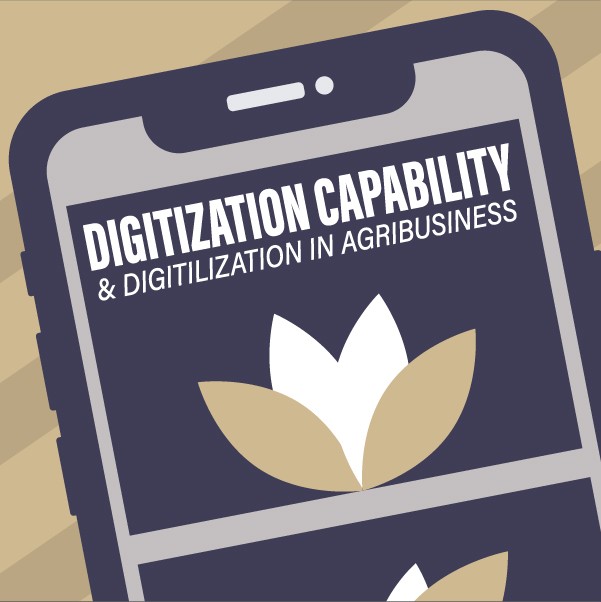Reviewer
Dr. Luciano Castro, International Adjunct Professor

Article
Digitization Capability and the Digitalization of Business Models in Business-to-business Firms: Past, Present, and Future by Thomas Ritter and Carsten Lund Pedersen
Journal
Journal of Industrial Marketing Management. 2020. Vol. 84(4), pages 180-190
Summary
As many industries evaluate potential digital acceleration caused by COVID-19 and how their businesses will be impacted when the economy rebounds, a question being asked is, “Are businesses really capable of incorporating more intensively digital solutions as required by external forces if they so wish?”
As strategy handbooks say, a capability is a qualification or skill necessary to perform a certain activity or the capacity to deploy a combination of resources through collective organizational routines to achieve a goal. Thinking about digital trends within the current context, we can use this definition to form the following questions: What capabilities or skills are necessary to perform well in a more digitized industry? What resources should be used and how do we combine them through collective organizational routines to thrive in a more digitized economy?
The authors in this article worked on a conceptualization effort, bringing together different reviews on the topic of digitization to present a comprehensive model on what skills and proficiencies a company must possess in order to build a digitization capability. This work is eye-opening as it uncovers different aspects and can be used as a check list for companies in the process of creating or reassessing digital efforts.
The authors’ digitization capability model is based on three dimensions. The first is related to the capability of generating, transmitting, storing and accessing data. The second is related to the aspect of permission. Does the company have permission to explore the data is has with regard to legislation, contracts with business partners and social acceptance? The third dimension deals with the capability of producing interesting data analysis, providing interesting reports to be visualized, and thus generating valuable insights and applications.
These dimensions are then unfolded into fundamental micro-components for strategy execution. The task then becomes figuring out how to evaluate individuals, processes and structures to develop an effective digital capability. The table below presents an organized summary of a firm’s digitization capability and the micro-components for execution.

A second valuable contribution from this paper is the distinction made from digitization to the term digitalization. While firms can build a digitization capability, digitalization will happen when there is a significant positive impact in the firm’s business model, otherwise the company has just added costs and lowered its return on investment.
If one takes different dimensions of business models such as capabilities, customers, value proposition and value demonstration the question that arises is how digitization may help for instance leveraging the selling or the logistics process of a company? Thinking about customers, how digitization may help knowing better the customers and fulfilling more customer expectations regarding the firm’s products and services and, finally, how digitization capabilities may empower the value proposition and demonstration to customers in different situations? These actual benefits should be real in order for the digitization capability be explored to the companies benefit and then digitalization takes place, transforming the firm’s business model.
What this means for Food and Agricultural Business
One of the most important recent drivers of change in the agribusiness industry has been the incorporation of digital technologies across practically all levels of the value chain. Particularly, the industry has seen sizeable investments in technology start-ups, reaching the impressive number of $7.6 billion, according to Ag Funder in 2019. The vast majority of these investments have to do with leveraging data to be used by farmers, ag-input suppliers, customers or service providers with promising results.
When sponsoring these investments, it is critical for companies to fully evaluate the digitization capability of their business and reflect on the digitalization potential for their business model. Reflecting on the dimensions of data, permission and analytics, along with the components of execution such as individuals, processes and structures may yield a more realistic view of how far the technologies are from having a significant and positive impact on the industry and the consequences for their business.
Often, survey results indicate that the promising and exciting future of using more data for the benefit of the agribusiness industry, and in particular for farmers, is far from applicability. Indeed, the evaluation of business models presents intriguing results thus far. Farmer Perspectives On Data, a recent report by Trust In Food, illustrates this point and brings evidence to the argument. The report states that there is low software usage and digitization by farmers with 62 percent simply not using any software and low satisfaction rates among those who did use data software in 2019 with 70 percent feeling unsatisfied with their digital tools. It also noted some farmers take issue with releasing their farm data, and many farmers have seen little advocacy from their trusted advisors on increasing data collection and digital usage.
As the digitization trend has recently accelerated in the wake of the current environment, reflecting on digitization capability and assessing the real changes it can bring to business models will be helpful in guiding investment decisions in a firm’s digital area.



